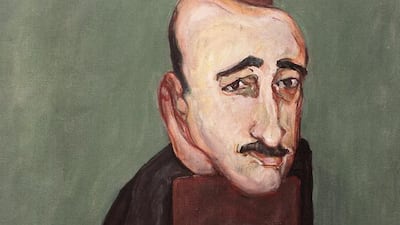Marwan Kassab-Bachi’s work hangs in the British Museum and Tate Modern in London as well as the Carnegie Museum of Art in Pittsburgh, Pennsylvania.
Recently, the Guggenheim Abu Dhabi acquired one of his paintings and now a staggering retrospective of his works has opened at Sharjah’s Barjeel Art Foundation – his first exhibition in a GCC country.
But his early years as an artist were not without struggle.
Although Kassab-Bachi comes from a wealthy family – he was born in Damascus in 1934 and now lives in Berlin – he worked in a fur factory for eight years between 1962 and 1970. But he never stopped painting.
“I could never stop,” says Kassab-Bachi, now 80 and battling ill health. “Painting is my life, it is like breathing to me. Without it, there is nothing.”
During the factory years, Kassab-Bachi would finish his work, go home and spend most of the night working on sketches that he would transform into larger oil paintings during his weekends. He didn’t socialise, he forgot about the rest of the world and instead immersed himself in his own sphere, painting portraits and trying to channel his inner essence.
Then, during the 1970s, the artist had a vision that inspired him to paint the human head as a landscape, capturing all the emotion and complexities of life. He describes this moment as a “gift from my imagination” and it was to shape his career from then on.
Kassab-Bachi is now one of the foremost artists of his generation, not only in the Arab world but around the globe. In 1994, he became the first Arab member of Germany’s distinguished Akademie der Künste.
Sheikh Sultan Sooud Al Qassemi, the owner and founder of Barjeel Art Foundation, started collecting Kassab-Bachi’s works six years ago, but only met the artist earlier this year during a trip to Berlin. The meeting proved momentous – Sheikh Sultan decided to host a retrospective exhibition of Kassab-Bachi’s work, which is now showing at the Maraya Art Centre in Sharjah.
Crucially, the exhibition features three paintings from the 1962 to 1970 period, of which very few remain. For this reason, Kassab-Bachi says that the Barjeel collection holds “the jewels of my career”.
The paintings in question are Munif Al Razzaz (1965), a portrait of the former secretary-general of the Syrian Baath party; The Husband (1966), a man with accentuated features and three arms in an awkward kind of self embrace; and Three Palestinian Boys (1970), which captures both the tragedy and the pride of the Palestinian cause in what has now become an iconic image.
Also featuring in the show is the 99 Heads Series. These 99 etchings were realised in 1997 and 1998 and point to two important aspects of the artist's career. Firstly, they reference Sufism and the 99 names of God.
“100 is not here,” says Kassab-Bachi. “Because 100 is the light and when you reach 100, you reach God.”
The imagery itself also summarises the key moments of Kassab-Bachi's career – the heads carved out almost to the point of abstraction, doll-like figures that became known as his Marionette series and other less discernible shapes that all signify points on his journey.
Having his lifetime’s work mapped out on a gallery wall must have been a very special moment for the artist, but he remains endearingly humble.
“I don’t think about the market, I don’t think about my audience. I don’t think about anything other than expressing myself,” he says. “I dig inside myself and try to see what comes out, but I never know what direction it will go in. My art is like a river; it is constantly moving. It goes and goes until it comes to the sea and then the river ends.”
Having said that, Kassab-Bachi, who turns 81 in January, admits it was a realisation of part of his dream.
“I am very happy,” he says. “The collection at Barjeel is very important because they chose all the most important paintings. It is very satisfying to see that my work has made a mark.”
• Marwan: Topographies of the Soul runs until February 6 at the Barjeel Art Foundation in the Maraya Art Centre, Sharjah. For more information visit www.barjeelartfoundation.org
aseaman@thenational.ae

